Bullying and Islam Series
The Shaykh ‘N Bake Shame Grenade – A Muslim Internet Phenomenon
Published

Presenting the Shaykh ‘N Bake: A critical analysis of the utilization of shame grenade discourse by Muslims on the internets and its efficacy. Please watch the following video along with the written explanation immediately after.
Definition of Terms
Shaykh ‘N Bake: To reverse a regular conversation into something serious, religious, or self-righteous. Characteristic of manipulative behavior. In other words, to lob a shame grenade. \’shām grə•nād\ noun – A rhetorical object hurled into a conversation to compel someone into a certain action via complete embarrassment. When detonated it makes everyone within its “shame radius” want to give up on life.
Usage
Keep supporting MuslimMatters for the sake of Allah
Alhamdulillah, we're at over 850 supporters. Help us get to 900 supporters this month. All it takes is a small gift from a reader like you to keep us going, for just $2 / month.
The Prophet (SAW) has taught us the best of deeds are those that done consistently, even if they are small. Click here to support MuslimMatters with a monthly donation of $2 per month. Set it and collect blessings from Allah (swt) for the khayr you're supporting without thinking about it.
Commonly occurs online. Utilized most often by overzealous people online under the guise of “dawah” or “naseehah,” but accounts to little more than a feeble attempt at self-importance and humiliation of others. The phenomenon is not unique to the Muslim community (see: Jesus Juke), but we do have our own distinct flavor of it. The easiest way to shame grenade someone is to conflate two situations that are not mutually exclusive (or sometimes even related) in an attempt to guilt someone into a desired action. “How dare you spend $3 on coffee instead of donating $3 to my project.” Or, “how dare you watch a movie in Ramadan, you should spend that time in ibadah.” Also, “if you love Islam and want people to stop starving, share this photo on Facebook otherwise you are complicit in their oppression.” Please see video above for more detailed real life examples.
Characteristics
If I haven’t seen it, it must not exist. 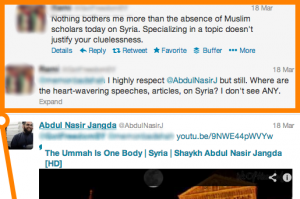
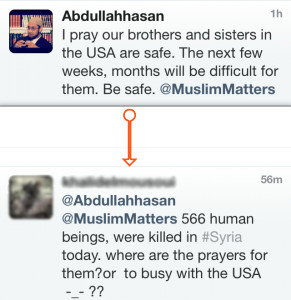

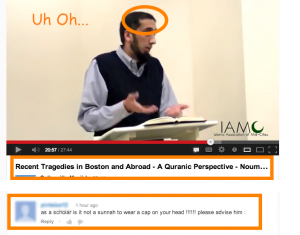

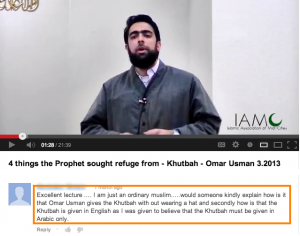
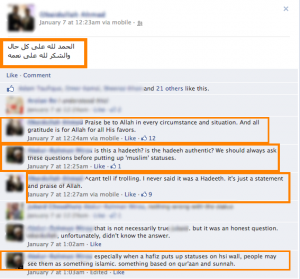
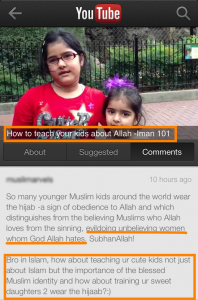
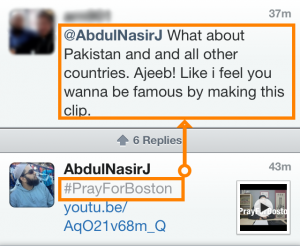
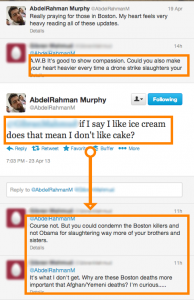
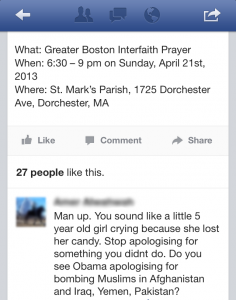
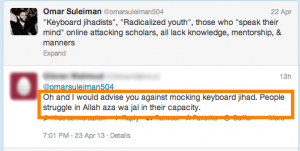
People who cannot articulate their faults or mistakes see life as a game. They are keeping score and they intend to win. They want you to submit but have no intention of submitting themselves. Theirs is not a world where we are supposed to create intimacy and trust through grace, but a world where we are supposed to accumulate power and security by tricking the people around us (Donald Miller, The Single Defining Characteristic of a Manipulator).
All is fair when you are working for a higher purpose.
Perspective
The most important lesson I have learned is to simply block these people out. There was a time where I used to engage and debate with people on issues like this, but life is simply too short. In the end, you don’t win anything. At most, you might change someone’s mind, but even that is unlikely. The most likely consequence is that they will kill your positive energy. They will make you hate life. They will make you wish you had never opened your mouth, about anything. If these people had their way, no one would ever accomplish anything good. In their mind, unless something meets their arbitrary level of perfection, it is not worth being done. Keep doing your work. Keep driving your bus, and don’t let them get on it. Anas ibn Malik reported: The Messenger of Allah, 
Humiliating people in the name of religion is the practice of someone deprived of the first fruit of religion, humility.
— nouman (@noumanbayyinah) August 29, 2013
“There are two types of people in this world: people who do things, and people who criticize those who do things.” — Ḥamza Yūsuf Quotes (@HamzaYusufQ) September 2, 2013
Insulting others is never a way of correcting them. Instead it causes more damage & proves that we need help ourselves. — Mufti Ismail Menk (@muftimenk) September 2, 2013
7. Haters are life’s truest losers. Do you want to end up losing everything that matters in life? Be a hater.
— umair (@umairh) September 1, 2013
Why do so many Muslims assume everything is forbidden, and look to deny and prohibit rather than encourage and inspire? — haroon moghul (@hsmoghul) August 29, 2013
2. Be a creator, not just a critic. Otherwise, you’ll always wonder.
— umair (@umairh) August 27, 2013
Do the hard work or support those doing it but dont hinder it. Some people neither do the work nor let others do it. — Mufti Ismail Menk (@muftimenk) August 23, 2013
“Shame الحياء” is a believer’s personal trait to introspect one’s own words-actions, not something to bring upon others #shamegrenade
— Nomaan Baig (@ShaykhNBaig) September 2, 2013
I’m always uneasy about the concept of “speaking truth,” as if we somehow know the truth and only have to enlighten others… — Noam Chomsky (@daily_chomsky) September 11, 2013
…who have not risen to our elevated level.
— Noam Chomsky (@daily_chomsky) September 11, 2013
When you are blessed or successful in any way, you must expect a fair share of haters. How you react to them is a part of your test. — Mufti Ismail Menk (@muftimenk) December 2, 2013
Keep supporting MuslimMatters for the sake of Allah
Alhamdulillah, we're at over 850 supporters. Help us get to 900 supporters this month. All it takes is a small gift from a reader like you to keep us going, for just $2 / month.
The Prophet (SAW) has taught us the best of deeds are those that done consistently, even if they are small. Click here to support MuslimMatters with a monthly donation of $2 per month. Set it and collect blessings from Allah (swt) for the khayr you're supporting without thinking about it.
Omar Usman is a founding member of MuslimMatters and Qalam Institute. He teaches Islamic seminars across the US including Khateeb Workshop and Fiqh of Social Media. He has served in varying administrative capacities for multiple national and local Islamic organizations. You can follow his work at ibnabeeomar.com.


Green March In The Sands Of The Blue Sultan: Morocco And The Conflict Over The Western Sahara

What Shaykh Muhammad Al Shareef Taught Us About Making Dua

[Podcast] Should Muslims Ally with Conservatives or Progressives? | Imam Dawud Walid

Iron Principle Under Pressure: A Profile Of Naledi Pandor

Far Away [Part 5] – There Is Only Work

Faith and Algorithms: From an Ethical Framework for Islamic AI to Practical Application

Quebec Introduces Bill To Ban Prayer Rooms On College Campuses

An Iqbalian Critique Of Muslim Politics Of Power: What Allamah Muhammad Iqbal’s Writings Teach Us About Political Change

MM Wrapped – Our Readers’ Choice Most Popular Articles From 2025

Far Away [Part 2] – Alone

[Dhul Hijjah Series] Calling Upon the Divine: The Art of Du’a (Part 1)

IOK Ramadan 2025: Four Steps | Sh Zaid Khan

IOK Ramadan 2025: Do Your Best | Sh Zaid Khan

IOK Ramadan 2025: Giving Preference to Others | Sh Zaid Khan

IOK Ramadan 2025: Which Group Are We In? | Sh Zaid Khan
Trending
-
#Islam1 month ago
Restoring Balance In An Individualized Society: The Islamic Perspective on Parent-Child Relationships
-
#Current Affairs1 month ago
Ahmed Al-Ahmed And The Meaning Of Courage
-
#Life4 weeks ago
Faith and Algorithms: From an Ethical Framework for Islamic AI to Practical Application
-
#Islam1 month ago
The Limits Of Obedience In Marriage: A Hanafi Legal Perspective

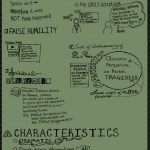
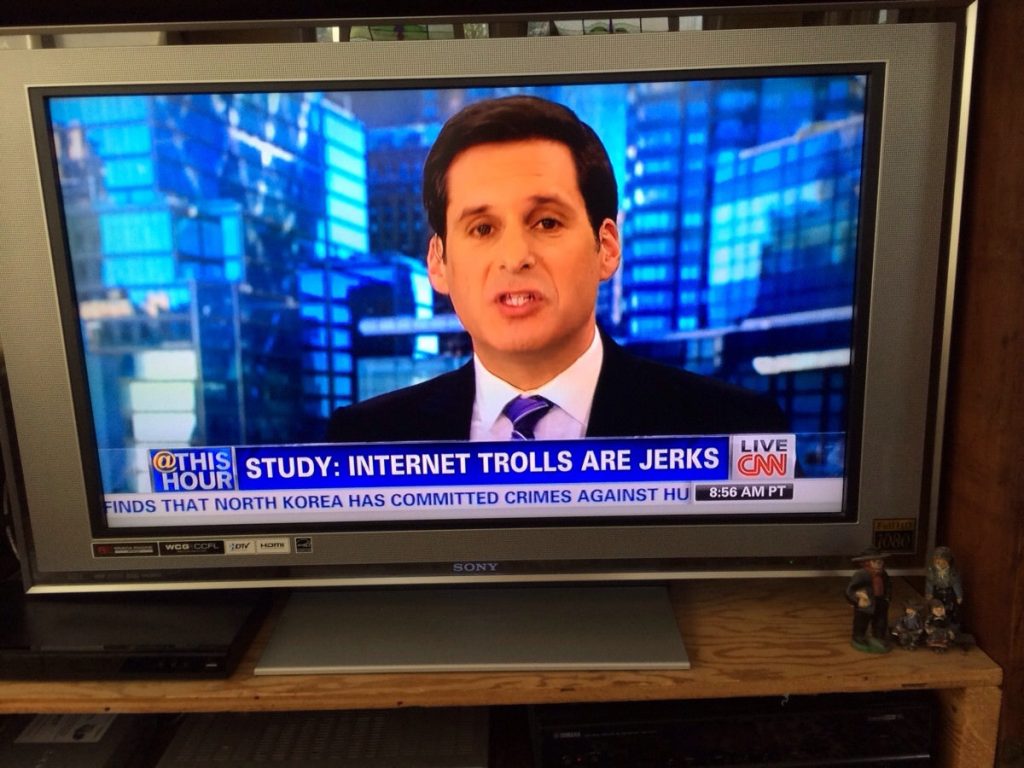











Sabeen Mansoori
August 27, 2013 at 9:43 AM
Jazakallahu Khairun. Well written and true.
Hassan
August 27, 2013 at 9:47 AM
Brother Omar Usman, why do not you write on sufferings and persecution of keyboard jihadists? I mean you are wearing a tie which may or may not be halal, not sure, burden of proof on you. I mean where is your outrage when keyboard jihadists have no internet connectivity? Do you know they are constantly bullied and made fun of. At least they are doing sabar in their capacity, while you are posting youtube video over a good bandwidth. They are your brothers and sisters as well. Have you ever made dua for them? Is this tarbiyah you giving to your children to ignore them? How rude.
amad
August 27, 2013 at 3:46 PM
By the way, I coined the term “keyboard jihadists” and I would appreciate getting credit for it from hereon.
-humble credit-seeker
Hassan
August 27, 2013 at 11:11 PM
Really? I have seen NYT using it as well. You should get nobel prize for something
Amad
August 28, 2013 at 4:50 AM
You are absolutely right that I should get credit but am too humble to push for it. If MM was sincere, then we would have “Shaykh” Yasir Kazi and “ibnabeeomar” who are more influential pushing for this credit. Because lack of credit is kind of zulm as I heard from one shaykh (i think he is from the kabeer ulema).
Unfortunately they are too busy talking about trivial matters like “Shaykh” Yasir on intimacy and “i-a-o” on cooking. Although I don’t like to digress, but deen is naseeha. And I hope that “Shaykh” yasir would focus on marriage rather than intimacy, which imho he is not very good in. After all, 100 non-intimate marriages are better than no marriage. I mean so many unmarried brothers (or only once married) out there. Anyway I don’t think he will respond to this comment as he is too busy earning big bucks in maghrib.
P.S. Some of you might think that this comment is pure bakwas but you should check your heart for thinking like that
P.P.S. This is my last comment on this subject unless someone forces me to respond as responding to wrong things is jihad in typing.
Muslima
December 6, 2013 at 4:14 PM
Bro, you for real though? Accept corrections and don’t be amongst the arrogant. You do not speak rudely to Teachers. For Wallahi the learned are the only ones that truly fear Allah SWT
Ibn Anjum
December 6, 2013 at 8:35 PM
Lady. The comment was obviously a joke.
Muhammed
August 27, 2013 at 11:02 AM
This is pretty much perfect – great analysis of an irritating trend that is difficult to put a finger on. It’s a shame scholars and community leaders have to waste precious time responding to a constant barrage of nonsense.
Abu Milk Sheikh
August 27, 2013 at 11:04 AM
As a follow up to this article perhaps you can write about popular students of knowledge, imams and du’aat being unable to take any sort of criticism whatsoever, no matter how constructive or valid. Rather, their behavior makes one wonder whether the Sacred Knowledge that they’re carrying has had any effect on them at all.
Common responses to constructive criticism include ad-hominem (“where did you study?” “what have you achieved?”), horn-tooting (“I went to al-Azhar,” “look at all my ijaazaat,” “respect mah authoritaa”), pandering to their cheerleaders, arrogance, passive-aggressive insults (referring to critics as “keyboard jihadists” and “living in their mom’s basement”) and the oh-so-effective delete/censor/block/ban. Everything _but_ address said constructive criticism.
Maybe some people resort to “Shaykh ‘N Bake” because they’ve experienced the above. Why should they waste their time when they know the response will be to act as if beyond reproach?
There is also a cheer-leader culture that exists among the followers of these authority figures – their are raised above their rank (4-year BA in Islamic Studies = “Sheikh”, MA = “Allamah”) and are treated as if they are incapable of making mistakes. This has an extremely harmful effect on the authority figures – it breeds arrogance.
The deference of the laity to those in authority is predicated upon their obedience to God Almighty and His Messenger, their actions and statements being in-line with God’s and His Messenger’s orders and prohibitions, their steadfast and upright calling to the Truth and clarifying it. Once they violate that Divine Mandate, all bets are off.
Siraaj
August 27, 2013 at 2:51 PM
It’s really chicken and egg. There are people who can’t give criticism well, and there are people who don’t take it well. Oftentimes the former drives the latter, though not always.
However, there is something to be said about engaging disagreements thoughtfully. The name-calling is a vicious cycle of fingerpointing – “He started it” – and eventually someone must break it, not by “calling out” the other, but let’s share differing views together.
I find the key is that we have to recognize differences can occur, and you may not come to agreement in the end, but you can at a minimum respect one another as Muslims and also stay out of the realm of questioning the heart or intentions of the other, as that’s not our realm.
Basic example:
“Scholar S1 took Position P1 on Matter M based on Reasons R1, R2, and R3
I disagree with Scholar S1 on Position P1 on Matter M1 because of CounterReasons C1, C2, and C3. Since I’m a layman, I’m not simply taking this from myself, but I’m referencing Scholar S2’s position which appears to hold more merit.
However, I respect Scholar S1, continue to make use of him as a source of knowledge, and feel nothing but the best for him as my brother in faith.”
I’ve found that when approaching like this, without name-calling, intention-guessing, and many of the other destructive behaviors Omar points out in his article, feedback is generally good.
There are those rare individuals who don’t have the maturity to handle any criticism, and what I like to do is maintain my posture of not attacking the other person as a person anyway because my job is simply to share the information, not force people to my side.
Siraaj
Abu Milk Sheikh
August 27, 2013 at 3:28 PM
While both the critic and the one being criticized are required to maintain Islamic manners, there is a World of difference between a lay-person behaving badly and a student of knowledge, imam or da’ee behaving badly. Without mentioning any names we’re seeing this bad behaviour become more and more common, and right in our own back yards.
Unless we’re setting the bar really low for the people of knowledge these days too, in terms of their expected conduct. It would make sense, the bar’s already been lowered significantly for considering someone as a person of knowledge.
Re: name calling, there are situations where it is justified. Just as there are situations where backbiting is permissible (six, according to Imam an’Nawawi.)
Frankly, if someone’s displaying nifaaq (i.e. traits that are exclusive to munafiqeen) we have every right to call them a munaafiq. The proof is in the Qur’an (at-Tawbah and at-Tahreem), the actions of the Sahaba radiAllahu anhum ajma’een and the Prophet’s silent assent sallallahu alayhi wa sallam. Don’t get it twisted, calling someone a munafiq is not the same as takfeer.
Now, we can’t see what’s in a person’s heart and we can’t make judgements about a person’s internal condition; we can only go by what is apparent.
‘Umar ibn al-Khattab said: “In the lifetime of Messenger of Allah (sallallaahu ’alayhi wa sallam) some people were called to account through Revelation. Now Revelation has discontinued and _we shall judge you by your apparent acts._ Whoever displays to us good, we shall grant him peace and security, and treat him as a near one. We have nothing to do with his insight. Allah will call him to account for that. But whosoever shows evil to us, we shall not grant him security nor shall we believe him, even if he professed that his intention is good.” [Saheeh al-Bukhari]
Funny thing is, the one’s claiming that the critics are intolerant to different opinions are themselves intolerant, sometimes caustically so, to people implementing valid opinions such as the one about nifaaq above.
ibnabeeomar
August 27, 2013 at 6:03 PM
if you only you were as dedicated to spreading something positive and beneficial to people as you are insistent about being able to label others as hypocrites…
Hassan
August 27, 2013 at 8:15 PM
Wait.., did you just threw shame grenade on him?
Siraaj
August 27, 2013 at 6:45 PM
If you would, please take note of the following contradiction:
Point #1:
Unless we’re setting the bar really low for the people of knowledge these days too, in terms of their expected conduct. It would make sense, the bar’s already been lowered significantly for considering someone as a person of knowledge.
Contradicted immediately by:
Point #2
Re: name calling, there are situations where it is justified. Just as there are situations where backbiting is permissible (six, according to Imam an’Nawawi.)
In your previous post, you mentioned:
“Common responses to constructive criticism include ad-hominem (“where did you study?” “what have you achieved?”)”
Tell me, how is it that when one group criticizes another with namecalling (sell-out, munafiq, etc) it’s perfectly justified and within good-manners, but when one group questions the other’s credentials to do so, this is bad manners unbecoming a person of knowledge?
If you claim you are justified in name-calling and you have Islamic backing, and your trusted Shaykh is doing it, then you will have the other group likewise citing the same evidences against you. You therefore should have no reason to complain about their bad manners since the evidences you cite can invariably cut both ways.
As I said, only way out is to break away from name-calling and intention-guessing, and speaking strictly about the points at hand and have the maturity to walk away and agree to disagree if all else fails. If someone else is into name-calling and backbiting, you take the higher ground and stay away.
Siraaj
Abu Milk Sheikh
August 27, 2013 at 10:43 PM
I don’t see a contradiction.
I was speaking of conduct in general.
I then mentioned a _specific_ case where it is allowed to call a spade a spade, for a Shar’i reason, that is backed by evidence from the Qur’an and Sunnah.
In fact, the evidences themselves obligate a Muslim to be harsh in this specific situation. This is how it was understood by the Sahaba.
I’m interested to hear which evidences can be used to permit general bad behaviour.
I am sure that you are aware of the fact that it is permitted to speak negatively about a person in several situations.
“The only way out…” is to follow the teachings of Islam. Disagreeing agreeably has its place, as does calling a spade a spade. Hikmah is to use both where and when necessary.
By the way, every comment of mine that you guys censor just adds weight to my argument that criticism, in whichever form, is not taken well. My comment pointing out OP’s poor reasoning and logical fallacies, both in the article and in his responses to comments was censored.
I have not being disrespectful, my tone is perfectly civil and I have stayed on-topic.
What’s the point of surrounding yourself with sycophants all the time? This article, like others on MM will have dozens of comments to the tune of “mashallah nice article, jazakallah.” While their duas are certainly of benefit to all, such comments add nothing to the discussion or our understanding of an issue.
Mahmud
August 27, 2013 at 11:55 PM
Assalamualaikum wa rahmatullahi wa barakatuh
I agree, and Abu Milk Sheikh, I think you have made some pretty valid points, just as this article has valid points.
It’s easy to feel comforted when you get 20, 30 thumbs up and everyone is agreeing with you. But what matters is how Allah judges it.
It might be that anytime anyone criticizes a Shaykh or imam they are immediately charge with “Shaykh n Bake grenade.”
If Umar RA was corrected by a Sahabi woman, what makes our sheikhs and imams free from criticism?
I think this article is correct in its essence. However, we cannot go to one extreme.
Siraaj
August 28, 2013 at 12:18 AM
Right, but unfortunately the shar’i reason is abused. For example, were I to look up some of your comments on other forums, I wouldn’t be surprised to find myself and others being called “House Muslims”.
Anyway, I’m glad to take that person’s good deeds any day of the week if they truly want to hand it to me, but I would prefer they learn to disagree without being disagreeable (or disa-gheebah-ful, get it, mwahahaha!) ;)
The contradiction is clear – when you feel justified, you can call a spade a spade, even if we disagree on whether the spade is truly a spade. But if someone else does likewise, then they are psycho-analyzing, they are in the wrong, they are sell-outs, uncle toms, and house muslims, and then some.
Problem is you can dish it out, but you can’t take it :)
I personally don’t mind the name-calling because I win either way since I never return the favor, though I prefer conversation with people who have been taught proper manners.
Unfortunately, the point I made about name-calling abuse is clear, as in the following contradiction (again, one sentence after the next):
“I have not being disrespectful, my tone is perfectly civil and I have stayed on-topic.
What’s the point of surrounding yourself with sycophants all the time?”
Is calling a person who surrounds themselves with sycophants, or insulting all the commenting readers who agree with the author as sycophants not disrespectful? Is this really calling a spade a spade? Can people simply agree without necessarily being sycophants? This goes back to what I said about abusing – taking a label and exaggerating, placing it on everyone who disagrees with you, or takes a different stance from you.
I also wouldn’t call such behavior respectful (as it seems you think you’re not being disrespectful). However, I’d expect since you consider yourself of the laiety, it’s ok because you’re not expected to know better, only the people of knowledge (or bloggers) you criticize should have better manners, so an anonymous person hiding behind a satirical pseudonym should be not be taken seriously enough to ask, “Who are you, and what qualifies you to classify me as a spade?” ;)
I think you’ve contradicted yourself numerous times already, and I think we’ll just have to agree to disagree. Unfortunately, what value we could have taken in the form of constructive criticism towards the people you’ve alluded to was lost in vitriol, venom, and offline venting.
Siraaj
Nihal Khan
August 28, 2013 at 8:07 PM
PAKARLIYA!
Solomon9
August 27, 2013 at 7:07 PM
Watch out Abu Milk Sheikh,….Omar’s 5’9″ and he’s got some fly socks on.
{Hahaha}
Seriously though, this is a great, and necessary article. Video could’ve have been longer, it was very good.
Omar and Abu Milk Sheikh both make valid points. It’s a “2-way street”.
Omar Ibrahim
August 17, 2014 at 1:11 PM
While I agree with all of your points, and would add that the use of clever terminology does nothing to aid in solidarity, and is its own kind of shame grenade. The central issue however is not a matter of soundness of logic or poverty of reasoning, but of manner and attitude which encompasses all. In Islam we are encouraged to comply with authority figures primarily for the sake of not disturbing the peace, though the rebel in us may frown at such a notion against unrest, it is not a motion for complacence. Rather, the “best of jihad” is a “truthful word”, not an ambivalent strike, and this demands both authority and reflection. One must accept that his circumstances are never devoid of his responsibility, and that he is never helpless or blameless, and that final judgement is with Allah.
The muslim then judges not the muslim or the kafir or the hypocrite, he judges action in order that he may deem for himself what is best. That this manifest in pride in one’s faith or arrogance is inevitable, but only the latter which causes damage, while the former may be a natural shame. When it comes to written word, we have certainly taken the medium far too greatly for granted: that our final miracle was a book of words borne by a man (upon him be peace and blessing) warrants only the greatest respect and consciousness with regard to language and its uses.
Consider the microcosm of our circumstances being within this article and the subsequent commentariat responses which, at first glance, easily far surpass the parent article in length. What of content, depth and breadth of perspective? In simple terms, many of our esteemed “scholars” and leaders in the modern muslim world have simply taken on audiences larger than they bear the capacity for, quite frankly, an audience warranting celebrity status. Not that there is anything inherently wrong with being revered by people in such a manner, though it is somewhat confusing that there are so many, but this is another issue.
When you consider the lack of solidarity apparent at the global level for muslims and non-muslims everywhere this can be devastatingly disheartening to the individual, the modern man. The tired and true but ineffective response to such collective unrest is always the same at the political level, everyone will wish to lay claim to reforms, and pay the way for greater solidarity and unity. The problem is that were such marvelous unity to take place it would necessarily begin at the smallest levels. How many youth are left neglected by their own family, and how many voices are left unheard in everyone of our communities? What has this done to our sense of identity and what then possesses us that we feel the urge to step on to a global stage? Wallahu A’lam
Abu Coconut
August 18, 2014 at 1:58 PM
your reply should be an article itself. excellent
KiKi
August 27, 2013 at 11:56 AM
LOL! LOL! LOL! This is, hands down, the best article I’ve read all year. Unfortunately I don’t have daleel to back that statement up. :P (Still, it’s so hilariously accurate that it’s scary.)
Ali (@Ruh_shu)
August 27, 2013 at 12:23 PM
Assalaam aleikum,
Although some of your points are valid, this is not a fair assessment. Most of these reactions stem from a very real fact that majority of our sheiks and ulamas are too afraid or too timid to speak against the oppression and the political realities facing our ummah. When we seek leadership we find none.
We as common people will look for solutions, and when the only solution provided is to go to the masjid to pray, and to increase our eemaan, while our brothers and sister are being slaughtered/oppressed in our own country or the neighboring country, there will be an air of discontent at the very least.
In this case, of course different people will take different paths. Some will adapt a more pacifistic Islam, others a more jihadi path picking and choosing verses of the Quran and Hadith that would promote their corresponding versions/vision. However most will just lose themselves in worldly matters, reducing Islam to a cultural or national identity rather than a way of life.
So in the scheme of things a sheikh who is vary of being “shamed” over something he might have done or not done is overreacting in IMO. An insignificant “MuslimMatter”.
Pls, excuse the poor grammar.
OneTwo
August 27, 2013 at 4:17 PM
LOL. You cannot script this nonsense better :)
Ali (@Ruh_shu)
August 28, 2013 at 5:48 AM
Nonsense? Please explain with your superior intellect, and admirable arrogance why u though my comment was nonsense. Maybe u can enlighten me.
Aly Balagamwala | DiscoMaulvi
August 28, 2013 at 6:15 AM
Dear “OneTwo”:
Your comment is in violation of our policy. Please use a valid email address, a valid name/kunyah and avoid making other commenters feel “unsafe”.
Thanks
Stranger
August 27, 2013 at 12:52 PM
jazakAllah khayr, great points that all of us can take benefit from. i know a lot of us reading will immediately think of people we know that practice such things, but we should also internalize the points for ourselves as often times we may be exhibit those traits unknowingly. also a good reminder below:
Rasul Allah (sal Allahu alaihi wa sallam) said: “Whoever does not argue when he is in the wrong will have a home built for him on the edge of Paradise. Whoever avoids it when he is in the right will have a home built for him in the middle of Paradise. And whoever improves his own character, a home will be built for him in the highest part of Paradise.” [Tirmidhi]
Fatima Ariadne
August 27, 2013 at 12:53 PM
Ooooooohhh my wooordddsss I LOVE LOVE this article!! So spot on it’s scary! Actually what made me scary most is how people easily throw online takfir, telling others “you’re kaafir/kufr/munafiq/mushrik/heretic/etc”. I remember a while back on youtube comment some hardcore said like, “after all it’s online, after I make takfir to you I can runaway undetected”. Whaat?? Do these people realize their actions are NOT immune from recording angels!!! (rant)
We all must return to Umar ibn Khattab message, “don’t judge a person based on his Qur’an recitations, for it’s nothing but his speech. Look at his attitude and actions”. Unfortunately, this is what happen when we have little deen knowledge but feels like with such little knowledge we’re one level with scholars and have right to put others down, mostly just because they’re not in line with our thoughts. This article is great for self-reflection too sometimes we think online anonymity makes us feeling too safe….
ibnabeeomar
August 27, 2013 at 1:49 PM
I would like to thank the people who shame grenaded this article in the comments section. I’m not talking about the obviously sarcastic ones, but the serious ones that were unintentionally humorous. Thanks for all that you do, this article wouldn’t have been possible without you :)
Abu Milk Sheikh
August 27, 2013 at 3:03 PM
Re: inability to take constructive criticism –
Case. in. point.
Heck, there’s even a passive-aggressive insult thrown in for good measure.
Did I call it, or did I call it?
amad
August 27, 2013 at 2:00 PM
More drivel from Omar, who has “arabized” his name to ibnabeeomar to act shaikhy,
Wish he would spend more time writing about imp. issues like Syria or Egypt than researching cooking.
Please note that I am only a humble observer.
Ashhar Raza
August 28, 2013 at 4:19 PM
are you for real? :D :D
sheikha
December 6, 2013 at 4:53 PM
Hun, you don’t tell him what to do with his time, I think better than you he should know how to utilize his time. You see, once I used to think like you, I used to ask my teacher why nobody got angry over all of this. But bro, you see anger has never been solution. So what’s the point if he just comes on here and starts and blabbing about what’s going on in Syria, all of us know they are being killed unnecessarily but instead off talking amidst ourselves, there should be dialogues between us and them and if you really know what’s going on, you’ll know syrians and yemenis aren’t the only ones being killed and you’ll know that leaders from Turkey etc are actually doing something. You do not just wake up one day and say i’m gonna change the world
Abdul-Razzaq
August 27, 2013 at 6:29 PM
Haters gonna hate!
Aly Balagamwala | DiscoMaulvi
August 27, 2013 at 10:09 PM
I have been Comments Team Lead for MM for the past year and some. That really should be enough said! :)
All I can say is that I wish my biggest problem was islamophobes who were not versed in the etiquettes of Islamic discussion but sadly it is my fellow muslims that have questioned my sincerity to Allah’s Deen, pronounced takfir (whether outright or by calling me a Munafiq), and Allah knows what else:I bear the scars of many a wound by fellow Muslims. It has been my best effort (and may Allah help me improve this) to always address the issue at hand never the person making the comment. I can’t say I always succeeded and sometimes have even removed my own comments feeling they violated the standards. Even some MM authors also have had comments edited/censored in my quest for being fair. I sometimes feel like telling people to stop learning aqeedah and fiqh any further and to just learn manners from him whose manners were the example of perfection (SAW).
May Allah guide us all especially me (on any side of any issue, whether scholar, student of knowledge or layman) to follow the manners of the Prophet (SAW) especially when the heat is turned on and the other person is transgressing.
*Comment above is posted in a personal capacity and may not reflect the official views of MuslimMatters or its staff*
Abu Milk Sheikh
August 27, 2013 at 10:49 PM
Aly, whether justified or not, someone calling you a munafiq does not equate to takfeer in any way. This is a misconception.
And prioritizing learning good manners is a sunnah of the scholars.
Aly Balagamwala | DiscoMaulvi
August 28, 2013 at 1:06 AM
> someone calling you a munafiq does not equate to takfeer in any way
The context it is stated in most comments does mean that.
ZAI
August 27, 2013 at 10:54 PM
Brilliant article. Brilliant. Long overdue…
I hope you know though, Br. Ibn Abee Omar, that you can look forward to being added to
one of their forum or YouTube lists of “deviants”, lol. For your own benefit and to “warn the Muslims” of course, lol.
What I find amusing also, is how these types want to speak about high, nuanced and complex concepts like Tawhid, Jihad, Shari’ah, etc…but they do not even have basic basement level
akhlaq. Right here, you regularly see their comments receiving the good ‘ole moderator warning( Keep up the hard work ya Br. Aly..and thank you): “Comment removed in order to comply with MM Comments Policy”..lol. They cannot even make it through a comment without losing their temper, slandering, libeling, insulting or threatening, and they want to give people da’wah and naseehah..lol.
I think this all boils down to arrogance and insecurity frankly…atleast for most of these types.
It’s not really about where the kafirs are going to spend eternity, who is a munafiq, fasiq, etc. It’s really about the converse of making THEMSELVES feel special. Judge and condemn others…raise oneself. It’s all arrogance and insecurity at the heart of it.
Great article! One of my favorites of ALL TIME. Keep up the good work brother!
Tareq
August 27, 2013 at 11:56 PM
Asalamualaykum wa rahmatullah wa barakatuhu
I have an an unfortunate tendency with comments sections, if the post is more than a hand’s width long and/or riddled with grammatical errors I will ignore it. Either suggests that the reply is ill thought through and ill suited to the context.
Even if english is one’s third language, written communication is so prone to misinterpretation that we should make the effort to fully articulate our point succinctly. Rereading the reply before posting may assist too, as well as thinking “am i ready to publish this to the world?”
Abez
August 28, 2013 at 2:02 AM
“First shalt thou take out the Holy Pin, then shalt thou count to three, no more, no less. Three shall be the number thou shalt count, and the number of the counting shall be three. Four shalt thou not count, neither count thou two, excepting that thou then proceed to three. Five is right out. Once the number three, being the third number, be reached, then lobbest thou thy Holy Hand Grenade of Antioch towards thy foe, who being naughty in My sight, shall snuff it.”
Abez
August 28, 2013 at 2:21 AM
I remember a comment on a brilliant Zakir Naik lecture that had nothing to do with the content of the lecture, but skewered him for daring to preach Islam… in a suit.
People may intend good, but they are missing the mark by attacking/condemning/shaming instead of having a relevant, respectful discussion. From a commenter’s perspective it may not seem like a big deal, but from a writer’s perspective it feels like being kicked in the face. One particular shame grenade lobbed at me put me off writing for almost an entire year, and if that’s the commenter’s agenda (Good, let her stop writing!) then imagine a world where Muslim writers have all been shame-grenaded into silence.
Not only would there be a massive loss to the Muslim internet world, there would also be no one left for people to troll. So it’s a loss for both, really- writers and trolls alike.
If what a Shaykh says is good & correct about say… health and fitness, we can benefit from the advice and say Alhamdulillah without shaming him for having eaten at McDonald’s once or being a few pounds overweight. Because he was talking about how good it was to take care of our bodies, NOT how perfect he was at doing it. Those are two entirely separate topics.
We’re all imperfect, writers and commenters alike. Like religion, the goal is to look at the message itself, because it’s been over 1400 years since we got an official Messenger, peace and blessings of Allah be upon him. We’re here to remind each other of the good, PRIVATELY AND TACTFULLY guide each other away from evil, and remember that perfection is only with Allah, and attacking one another (versus respectfully discussing relevant disagreements) is only from Shaitaan.
Luiza
August 28, 2013 at 9:28 AM
lol it says it in that same article it will happen again!!
Anyways, thank you for putting this into words finally someone spoke about it. It’s sad to see our shuyukhs attacked like this and humiliated in public for being good or doing good!!!
I used to be this person who would respond back in behalf of the shaykh but like you said I realized there is just way to many of them and i have no time to waste so I leave a positive comment and move on and this is what really counts.
Once again thank you for taking the time
wa salams
AbuIsa
August 28, 2013 at 12:06 PM
TabarakAllah – an outstanding article. This situation can be easily translated to social gathering or a family / couples discussion where someone comes to us all excited / passionate about say their football team and we throw a shame grenade about a totally different topic (e.g. did you clean the room)!
I have been on both sides – Sometimes, we are consumed by a thought or are just coming of reading an article that affects us or (in the above e.g. coming from a messy room) and that is all we are thinking about and not even listening to the other person.
The article is a beautiful reminder for us to be conscious of the situation, context and time before we speak. InshAllah we can avoid some of these if actively listen to the speaker and try to comprehend and use what we can from it.. Barakallah feekum
Wajid
August 28, 2013 at 12:55 PM
Salaam alaikum,
MashaAllah excellent article. Serious question: What do you term the opposite of a “Shame Grenade”?
ibnabeeomar
August 28, 2013 at 12:57 PM
actual naseehah? :)
WAJiD
August 28, 2013 at 2:31 PM
haha… I meant the act of dismissing genuine naseeha because of the way it was delivered rather than the content itself?
ibnabeeomar
August 28, 2013 at 2:45 PM
hmm not sure on that one. in my mind the onus of responsibility is on the one delivering it to do so in the appropriate manner
The Salafi Feminist
August 30, 2013 at 1:12 AM
I actually prefer this perspective:
http://muslimbestlife.com/when-obnoxious-people-keep-you-from-admitting-youre-wrong/
Solomon9
August 29, 2013 at 7:11 PM
“What do you term the opposite of a “Shame Grenade”?”-WAJiD
Great, and fair, question WAJiD! Maybe Omar should be the only one to answer this question since it is his article, but I would say the opposite of “Shame Grenade” is:
“If you don’t agree with me, or praise me, you’re a ‘Hater’- The Other Side of Shame Grenade”
Shahin
August 28, 2013 at 3:29 PM
This did shed some light on the “Shaykh n’ Bake” phenomenon, but I feel like this article also throws the “shame grenade” on everyone. I would like to esp. point out the “fake humility” bit: there are so many people online who are sincere and want to learn. I have seen questions asked and clarifications given in the youtube comments section and facebook and what not. After reading this article, I feel like people would have this sort of thing in the back of their mind to label *every* curious person on the internet as someone with negative intentions. It’s kind of confusing really.
Hyde
September 3, 2013 at 8:46 PM
YT should be probably the last place on the Earth to get any real advice of any kind.
muhseenah muhammad
August 28, 2013 at 4:42 PM
Salam. Please @ibnabeeomar continue your good work and do not allow comments of people ( who may not even be who they say they are) hinder you from saying the truth. May Allah continue to guide and protect you. Amin.
Mobeen
August 29, 2013 at 1:29 AM
Great article Omar. It is noteworthy to mention the contribution of the internet and social media in exacerbating this tendency – prior to such accessible online forums, advising and criticizing required direct human engagement, whereas now any tom, dick, or harry can criticize as he/she pleases under the cloak of virtual anonymity.
One of the things that any activist/scholar has to negotiate is the extent to which they want to have an online presence. Part of taking on a more active online profile is the reality of the type of micro-analysis you make mention of in your piece – individuals will question your intentions, feel envious, and undoubtedly nitpick. The downside as has been mentioned above is that forums for providing constructive criticism or merely asking questions are drowned out by obnoxious, ill-mannered haters. I pray your post contributes to reducing such clutter and serves as a reminder to us all to vet our intentions prior to our own writings.
Lastly, it is perhaps worth considering the converse as well given that we are discussing the interactions that scholars have online with others, which is receiving consistent praise and needing to manage ongoing adoration – even as a local activist one has to keep him/herself in check against regular complements and restrict the impulse that relishes in such praise and seeks it. On that note, perhaps the best article I’ve read was on MM by Shaykh Yahya Ibrahim – it was very heartwarming and so I figured I’d share in the comments section here: http://muslimmatters.org/2012/09/18/shaykhs-need-advice-too/
AbuIsa
August 29, 2013 at 2:54 PM
Salaam – good point. We need to keep in mind a few basics when giving Naseeha (probably more applicable when its online)
– critique the contents / not the person
– Stay on the topic (don’t go into tangents)
– Don’t make it personal
– When in doubt ask clarification (without the shame grenade please)
– If you want to give advice to the author / Sheikh, please do so in a private manner. All Social Media tools give you the option of contacting the person individually….
– and when in doubt, refer to this article – awesome reminder
ibnabeeomar
August 29, 2013 at 8:57 PM
excellent points, jazakallahu khayr. i think a follow up post to this discussion might be something along the lines of analyzing platform building (pros and cons along with focus on self promotion that you’re referring to).
its kind of weird in the sense that we acknowledge social media has transformed our lives in all realms but we havent done a proper critical look at how it affects certain islamic aspects (e.g. scholarship/activists/etc)
Usman
August 31, 2013 at 2:45 PM
You guys just dont get it.
Mohammad
September 2, 2013 at 1:54 AM
One thing that upsets me is that the tone in some popular Islamic forums is always very aggresive and “angry”. Labels of Kafir, Rafidhi, Nusayri, Majoos are thrown about casually, and anyone with a point of view against the majority can be called such names. If it was a fringe forum I would ignore it, but when the most popular Islamic forum on the web is like that it gives a very bad impression to non-Muslims and Muslims alike
Hyde
September 3, 2013 at 10:05 PM
I would be lying if I said I was not to blame for this. But there is, I think a psychological reason behind why people shoot the grenade. I think it has to do with guilt. If people did sinnin in the past or were associated with something that was haram, and they now want complete dissolution fromt hat, they appear to be more offensive than ever before to others who may be [nonchalantly] doing that.
For example if I see an imam or for that matter anybody talking movies, music and sports I feel like ‘oh what is he talking about’ or ‘how could HE talk about such a waste of time’. Because I use to spend so much time on this nonsense [and other ‘hanky-panky’ things], so I am hyper-sensitive to all this stuff and find it very uncomfortable to see how others could just easily talk about it. It is my own guilt that I wallow in.
It is like when I was doing stupid stuff, I expected Muslims to be perfect, but I became more islamically oriented I still demanded perfection.
Further as tender wounded, I feel more palpable when I see the “wrong going” around. It really is about the the accuser then the accused.
bintA
September 9, 2013 at 9:38 PM
Assalamu Alaikum Wa Rahmatullahi Wa Barakatu,
JazakAllahu khayran, a thoughtful analysis on a common phenomenon. May Allah increase us in hikmah and adab and allow us to safeguard our tongues from that which displeases Him. Allahumma Aameen.
One common thread that can be seen is the tactic of distraction in its many forms. The individual doesn’t address the matter at hand, but instead brings up a new and unrelated matter (as per the ‘Guilty until Proven Innocent’ and ‘Zero-Sum Game’ examples). Essentially, the individuals in these examples are saying ‘Why aren’t you focusing on something else, something bigger, something more important?’
This same tactic is used when people belittle issues or phenomenon. They don’t speak to the issue at hand, but bring to light another issue that’s more deserving of our attention than the one that is spoken about. Recently, I was made to think of this upon reading a question someone posed. An individual expressed thoughts on the impermissible nature of a woman reciting the Qur’aan in a mixed gathering. In response to this, the following question was posed: more of a threat: woman reciting Quran at ISNA or kids listening to trashy music by female singers?
Essentially distraction is being utilized here; one doesn’t speak to the issue that was raised, but simply poses a question which seems to argue that there are greater things to worry about, more important matters that deserve our attention – effectively belittling the issue that was raised. It also serves to stifle conversation around the topic, illustrating it as relatively insignificant. The question itself escapes any real, meaningful commentary on the event itself – the only comment on it is essentially a non-comment (‘we should be speaking of other things’). These are perhaps not the intended messages that the questioner wishes to put forth, but nonetheless, they are what the question itself suggests.
While encouraging others to re-prioritize has it’s time and place, it’s perhaps not an approach to be brought up in response to an event that was unprecedented, deemed impermissible, and yet still widely being touted by some Muslims as a progressive, acceptable, and positive step. The questioner juxtaposes two problematic scenarios, but seems to give implicit precedence to the latter (trashy music) over the former. While the latter is a known and accepted impermissibility, people’s reaction to the former spells a sort of ‘hidden’ impermissibility if you will, one that we are either unaware of or don’t wish to address. The waters are further muddied by the fact that this recital took place in an Islamic environment.
This brings to light a further discussion on the climate we find ourselves in – the silence that surrounds these issues, womens’ purported ownership of this narrative, and by extension, the demonization of brothers who speak on these issues (noting their impermissibility), the way in which we call them backwards and misogynistic when they merely reference ahadeeth and scholarly texts, and the way in which sisters who too agree with the impermissibility of such phenomenon are also reprimanded (painted as those who have accepted their inferior status).When we promote silence on these issues, we cease to acknowledging them, their greater significance, and the direction we are charting. There’s a greater discussion to be had, and when we adopt silence, and speak of greater priorities, we effectively stifle that conversation and belittle the issue. But I digress.
W’Allahu a’lam. Just some things that came to mind and some parallels that were drawn. Again, barakAllahu feek for the article. The concepts that were raised are important to consider and discuss.
May Allah increase us in that which pleases Him. Aameen.
Wa Salamu Alaikum Wa Rahmatullahi Wa Barakatu
Zaheer
September 10, 2013 at 7:38 AM
Wa Alaikumus Salamu Wa Rahmatullahi Wa Barakatu,
Insightful analysis. I think you are spot-on when you mention that this tactic of ‘distraction’ is often used inadvertently, and unintentionally. Some are obviously just present at these discussions (online or not) to stir up something, cause confusion, conflict etc. May Allah protect us from such people and their fitna. However, many are not eloquent enough, or do not think their questions/statements through thoroughly enough before uttering them, to realise that they are comparing apples and oranges, and causing people to be distracted from the issue at hand.
As for your digression :-) I’ll bite – but I can only agree here, as this example sums up perfectly the “tactics”, or more kindly, argumentative ethic, of those who do not want their beliefs, actions, interpretations of our deen challenged. While the topic of women reciting in the presence of non-mahram men can be said to be “off-topic”, it’s a very good example of two things:
a) people causing distraction, and not evaluating an action/belief by comparing it to an obvious sin, i.e. what we have just discussed
b) how easy it is to have one’s good intentions (reciting Qur’an) marred by improper actions (women reciting aloud in mixed gatherings), a.k.a. idiomatically in the English language as “the road to hell is paved with good intentions”
So, good points and a good addition to the “Shaykh ‘n Bake” (I couldn’t resist; I’m sorry but that term is hilarious) phenomenon.
Zee
September 12, 2013 at 1:27 PM
Is it wrong to have assumed that this article might be about a Shaykh found “baked” with students…
Zaheer
September 13, 2013 at 8:19 AM
Salaam,
Haha, yes Zee, that is wrong.
Shaykhs don’t do that okay…But if they did, why include the students? Is it not possible for a Shaykh to be “baked” all on his own?
May Allah protect us all from the fitna of drugs, Insha-Allah ameen
fo11
October 1, 2013 at 3:22 PM
You made some good points. But I have a problem with the examples used, some comments where were real examples of people using the ‘shame’ grenade, evidenced by the fact they didn’t know the ‘cap’ isn’t Sunnah – but others were real criticism’s. The one with the inter-faith prayer, I would agree with the person who commented because there is no such thing is as ‘inter-faith’ prayer. The examples used are a mix of real criticisms and people who want to ‘shaykh ‘n’ bake’. They need to be distinguished properly.
Kayvee
December 5, 2013 at 1:06 PM
Mashallah this was great
The Jesus Juke link is no longer active
The funny thing about online haters, is that in person
I dont think they would ever act like that or say the things that they do
But the anonymity of the Internet gives them courage to be “themselves”
ibnabeeomar
December 6, 2013 at 9:35 AM
link has been updated and fixed, jazakallahu khayr!
osama
December 6, 2013 at 10:15 AM
very well researched, articulated and presented ! Hats off to you ! (Y)
Muslima
December 6, 2013 at 4:41 PM
As Salaamu Alaykum everyone. Uhh, seems like you people just don’t get it. We’re all Muslims here, promoting and loving our religion should be our priority. Say a non-muslim comes on here and reads your comments, he won’t have any need to be part of a people that have no love for one another talkless of their Imams and Sheiks. None of us truly believes until we love one another, now getting back at each other with hurting words is not actually a sign of love. I agree everyone should be able to voice his/her opinion, but if what you feel isn’t khair, no matter how strong your feeling, it would be better to keep it within you. Until we don’t act united, we won’t be a strong ummah. You think these Americans or westerners you are lashing out at so much that you hurt your brothers could have done what they’re doing and did if we weren’t so divided. I mean they couldn’t have done any of this when we were a caliphate, now the way you disrespect your leaders doesn’t say much of you, because no matter how much you don’t like what your leader is doing,it’ll better if you simply obeyed him, for in that obedience is obedience is obedience for your rasul and in obeying your rasul is obeying THE ALMIGHTY,THE WISE. Have you heard about the hadeeth where the prophet SAW says “when two Muslims confront each other with swords,then the murderer and the murderd are in hell” the companions asked him “O Messenger of Allah! That was a murderer, but what of the murdered?” the Prophet said “Because he was also keen to kill the other man”. Please be patient with one another brothers and sisters, we’re a brotherhood, not a fighters club.
Muslima2
December 7, 2013 at 1:46 PM
Dearest brothers and sisters of Islam,
I’ve waited for an article like this to be published for a long time, because I haven’t had the courage to say what it says. As Muslims our purpose is to live in the Sunnah of our prophet (pbuh). As I grew up, I was taught that Mohammad (phuh) was the kindest, most pious, and admirable man. He had his faith in Allah, but he never made his brothers and sister feel inadequate.
I feel like all of these “targeted” posts about how “I’m better than you” are taking away from the peace of our religion. By making our Muslims feel small and unworthy of Jannah, as said in the article, we’re driving people away from our religion.
I’ve seriously considered taking off my hijab permanently because of the negativity of my brothers and sisters. The way I see it is; my relationship with Allah is exactly that. Between me, and Allah.
That’s not to say that constructive criticism should be ignored. If you see a Muslim doing something particularly wrong, offer them a realistic solution to the issue.
Our religion is peaceful, let’s practise that. Stop with the internet bashing, and try another approach to getting your point across.
Lastly, if you see a Muslim inadequately practising the religion, pray for them. Don’t hurt them with your words and actions. Don’t weaken their Iman by making them feel inadequate. Let that person’s change come from Allah.
Jazakallah.
Mariam
December 8, 2013 at 1:32 PM
Assalamualaikum,
Let me add my two cents here.
While sheikhs and shame-grenaders (coined a new term there) are busy arguing, a large portion of the Muslim community is dealing with the most fundamental issues: Who is Allah? Do I believe in him? Why am I a Muslim? How can I start my 5 prayers a day?
I feel like people who shame-grenade should be ignored. The whole point of them doing this is for attention and to cause fitnah and they have achieved their goals. I hope Muslim scholars and activists and community members can come back to the basics of the religion and ignore all these voices of trouble no matter how hard it is.
AbdurRahman
December 9, 2013 at 12:26 AM
As Salaamu Alaykum,
While shame grenade throwers might be of different kinds, I’d like to point out something regarding one of those types. With the advent of twitter, facebook and social networking, it has become quite easy to broadcast your thoughts to the world. A lot of times ppl do that without actually stopping to think, consider the form in which they present their thoughts and the consequences of that.
Personally, I prefer social networking because I can write and actually see what I am conveying before I hit send/enter. I might have been guilty of this through speech, though certain adab videos have certainly helped me in that regard.
So I propose greater number of adab classes in every community for the benefit of some of us who are throwing shame grenades without even realizing that we were holding on to them. :D
Hafsa
January 21, 2014 at 6:09 AM
Seriously, ppl with issues need to go down and re-evaluate. Doing something good doesn’t mean you have to explain yourself with a hadith or quranic verse. Our religon, is a religon that if you do anything good, to a non-muslim or not, Allah (s.w.t) still rewards you. Al-hamdillullah, we still have sheikhs telling us the right thing, we should thank them and benefit from them not criticize them. They took the time to study and learn the knowledge their teaching us, while your some guy who probably found his “islamic references” from google. I’m 16 and even I can tell that were doing to these awesome sheiks are wrong.
Pingback: From Kansas to Palestine, Hatred and Pie | MuslimMatters.org
Pingback: Coca-Cola Faith: Solutions for #HappyMuslims, #Mipsterz, and Future Muslim Commercials | MuslimMatters.org
maliurj
August 16, 2014 at 4:11 PM
The fact that this writer took his precious to counter-shame others whom he perceived as shamers, proves that he has fallen into the same abyss of ignorance like those whom he is now attempting to shame by pointing out their mistakes. Save us from this nit-picking nonsense and address issues that are relevant and significant.
maliurj
August 16, 2014 at 4:12 PM
The fact that this writer took his precious time to counter-shame others whom he perceived as shamers, proves that he has fallen into the same abyss of ignorance like those whom he is now attempting to shame by pointing out their mistakes. Save us from this nit-picking nonsense and address issues that are relevant and significant.
Pingback: The Nafs and the Online Muslim Ummah | I speak for myself
Pingback: Shame Grenades | Rad Talks
Pingback: Shame Grenade | Everyday Jihad
Pingback: Social Media Activism: A Real Thing, Or A Trick We Play On Ourselves? - FiqhOfSocial.Media
Pingback: Social Media Activism: A Real Thing, Or A Trick We Play On Ourselves? – Ibn Abee Omar